Fashion Revolutionaries partnership with British Council

Fashion Revolutionaries Programme in partnership with British Council.
Fashion Revolution and British Council worked in partnership for 3 years (2017 – 2020) to develop a set of toolkits, methodologies, approaches and formats which could be adapted and replicated in projects, activities and events around the world. These toolkits and project formats were piloted by Fashion Revolution country teams around the world.
The Fashion Revolutionaries programme was created in collaboration with our Global Network which is present in 92 countries. You can find out more about our Global Network and their work by visiting their Country webpages.
Find out more about the Fashion Revolution Global NetworkProjects
The Fashion Revolutionaries partnership worked towards three key outcomes:
- Young citizens become advocates for sustainable, ethical and socially-engaged fashion
- Fashion SMEs design and produce fashion in a more sustainable and socially-engaged way
- Fashion plays a role in social change
It aimed to engage:
- Young people, to become more aware of the impact of their fashion consumption habits and understand alternatives through digital campaigning and cultural programming
- Designers and industry professionals, to develop better knowledge, skills and networks to embed sustainable practice in their work
- Policy and industry leaders to facilitate discussion around social and environmental sustainability in the fashion industry
Between 2017 – 2020 we collaborated on a series of project, events and activities under four key areas.
We developed a set of three Professional Skills Toolkits aimed at fashion professionals including designers and creative entrepreneurs. These toolkits were designed as ‘Train-the-Trainer’ resources to equip our Fashion Revolution Global Network with information and frameworks to encourage discussion, debate and skills exchange amongst their creative communities.
The toolkits were piloted in Mexico, Indonesia and Zimbabwe with groups of fashion professionals and were delivered as ‘Train-the-Trainer’ modules to the wider Fashion Revolution Global Network. They can be used to plan workshops, webinars, discussion groups, study retreats and tours and much more.
The Policy Dialogue element of the partnership was facilitated through a Policy Dialogue Toolkit which intended to encourage bottom-up policy research and dialogues. The toolkit was piloted in four countries: Philippines, India, Kenya and Rwanda to generate four policy research reports on topics specific to the local fashion industry. These research reports contain tangible policy recommendations generated through evidence-based and stakeholder led research and dialogue methodologies.
In collaboration with the British Council in the UK and overseas we hosted a series of educational events including:
- An international Study Retreat in Manchester in November 2019, bringing 16 Fashion Revolution Country Coordinators together to develop proposals for two global educational resources
- A dinner on Cyber Monday bringing educators, designers and creatives together to discuss and debate the future of fashion
- A series of international Fashion Open Studio events hosted at 50M in 2019 featuring Duran Lantink, a collaborative project between Bethany Williams and Aratrik Dev Varman of Tilla in India and a panel discussion between Ellen Rock, Alisa Ruzavina on their work with artisan communities
- A conference with the Onassis Foundation in Athens on ‘Crafting the Future’ of fashion
- A programme accelerator in December 2020 with 10 Country Teams from the Fashion Revolution Global Network introducing the resources, toolkits and frameworks to enable them to create project ideas and proposals
In 2019 we partnered with the British Council to launch a Creative Commissions fund across the Fashion Revolution Global Network. Five country teams were awarded with Creative Commissions grants to work with local artists and creatives to explore and articulate issues, challenges and solutions at the heart of their fashion industries.
In the Philippines, Fashion Revolution Philippines presented The Walk-Through, an exhibition featuring work commissioned by artists Tekla Tamoria, Anina Rubio, Pam Quinto, Tanya Villanueva, and Zeus Bascon x Jas Fernandez, which address themes, philosophies, practices, studies, technologies, and socio-economic insight in regenerative fashion. The work invited visitors to walk through, feel and ponder, and included a publication of the artists’ processes and was accompanied by their new fanzine Gossamer.
In Tunisia with the support of Fashion Revolution Tunisia, a group of emerging designers received materials from Denim Company DEMCO in order to explore zero-waste, upcycling and reconstruction in the aesthetic of traditional Tunisian costume.
In Zimbabwe local designers were afforded new opportunities to collaborate with local clothing factories, tanneries and businesses to gather materials that would otherwise be waste and repurposing them into pieces of wearable work. The process was captured in a series of films
In Cambodia, Fashion Revolution Cambodia organised a collaboration with Cambodia Children’s Fund which saw the materialization of the Re-A-Dress Challenge, a 10-week upcycling programme for local high school students in a garment manufacturing neighbourhood of Phnom Penh. “Fashion Packs” were supplied by Fair Sew which comprised of a weighted selection of garment offcuts, thread, needles and instructions. After 10 weeks of experimentation, testing, modifying, constructing and lessons with local craftspeople, new work and concepts were presented in an exhibition.
In Vietnam at the CUC Gallery in Hanoi Women’s Museum, Fashion Revolution Vietnam explored the sustainable fashion movement through a curated programme of workshops and film screenings for local students, and interactive installations presenting the impact of fast fashion in the community. It also displayed an original commission by photographer Le Xuan Phong, capturing sustainable fashion leaders in Vietnam to inspire the audience to be more aware of #whomademyclothes.
Resources and Toolkits
The Fashion Revolutionaries project generated a series of resources, reports and toolkits. Some of which are available for download as open-source resources and others which are available to our Global Network and their partners on request.
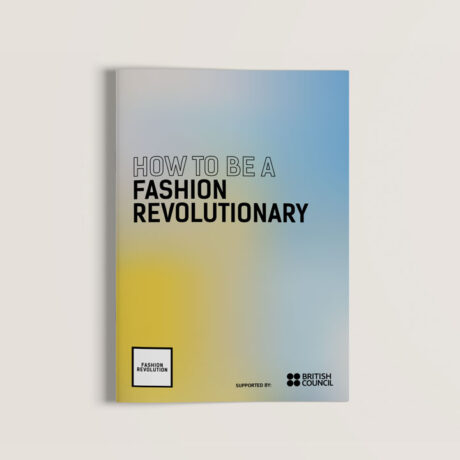
How to be a Fashion Revolutionary
This open source resource aimed at students and young people is full of inspiration and ideas about how you can use your voice and your power to transform the fashion industry as we know it.
DOWNLOAD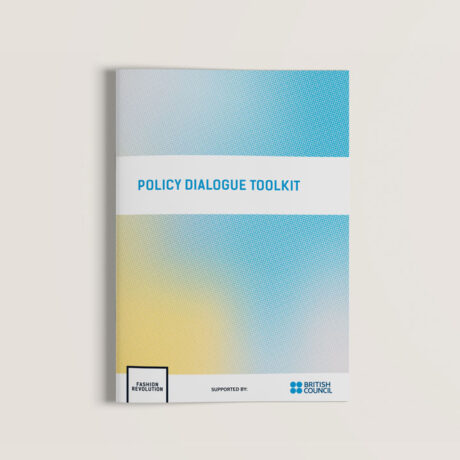
Policy Dialogue Toolkit
This open source toolkit is designed for a wide range of audiences interested in or affected by the fashion and textiles industry. There are essential parts, but the toolkit is not prescriptive. Use it step-by-step or pick and choose the tools and techniques that make the most sense for you. Includes a series of worksheets and exercises.
DOWNLOADPolicy Dialogue Report: Situating Alternative Textiles in Kenya
This report provides an insight into the potential to stimulate local production and entrench sustainable practices into Kenya’s Textile and Apparel sector. Published in 2020 by Fashion Revolution Kenya.
DOWNLOAD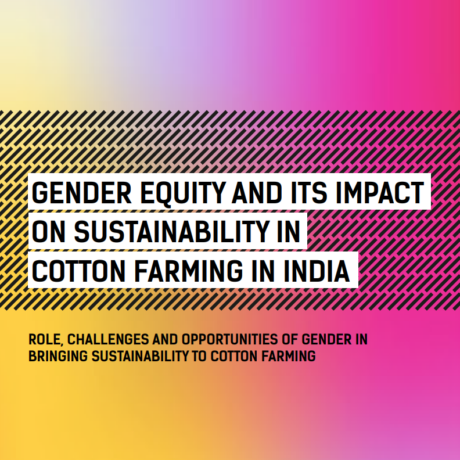
Policy Dialogue Report: Gender Equity and its Impact on Sustainability in Cotton Farming in India
This study worked with local stakeholders to enable evidence-based and stakeholder led decision-making around the topic of gender equity in cotton farming in India. Published in 2020 by Fashion Revolution India.
DOWNLOAD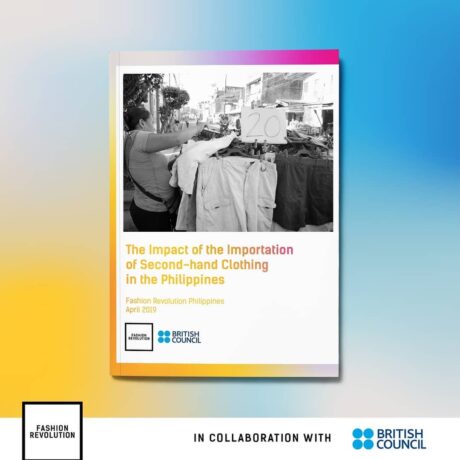
Policy Dialogue: The Impact of the Importation of Second-Hand Clothing in the Philippines
Through policy research and a policy dialogue event with local stakeholders the Fashion Revolution Philippines team collected evidence-based and stakeholder led research to encourage decision-making around the topic of importation of second hand clothing in the Philippines. Published in 2019.
DOWNLOAD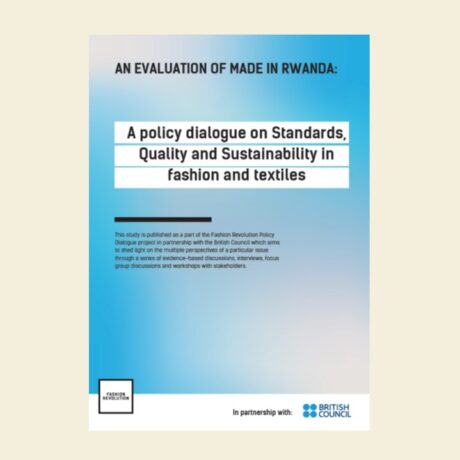
Policy Dialogue Report: An Evaluation of Made in Rwanda: a policy dialogue on standards, quality and sustainability in fashion and textiles
This research report created by the Fashion Revolution Rwanda team investigates the 'Made in Rwanda' policy and makes recommendations for the strengthening of this legislation in the fashion industry in Rwanda. Published in 2021.
DOWNLOAD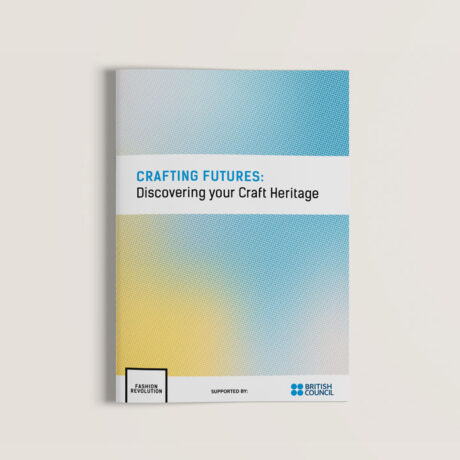
Craft Heritage Toolkit
This open source toolkit helps Fashion Revolutionaries explore their own craft heritage story, encouraging educators, students, designers and individuals to unravel their understanding and creativity by uncovering their personal artisanal heritage. Our global textile history is steeped in beauty and full of hidden secrets. Explore yours!
DOWNLOAD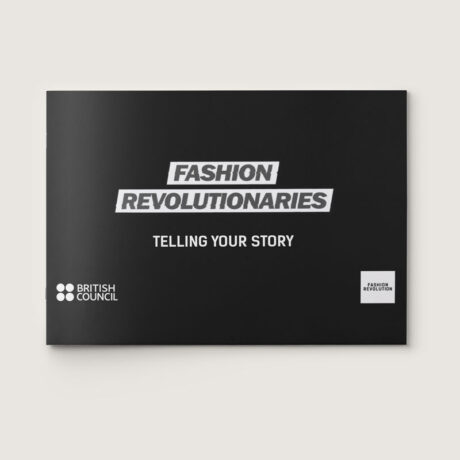
How to Tell Your Story Toolkit
This toolkit is open source to the wider Fashion Revolution community. It was created to accompany the Fashion Revolutionaries film series to enable designers, creatives and artists to capture their stories visually using DIY filming techniques.
DOWNLOAD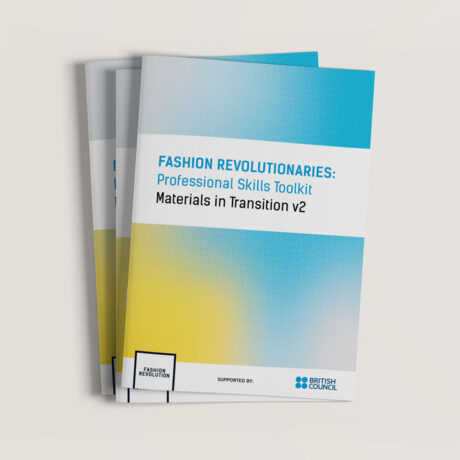
Creative Commissions Toolkit
Available to Fashion Revolution's Global Network and their partners on request this short resource guides our global community on engaging with artists and creatives to produce inspiring and insightful creative projects to raise awareness on issues of social and environmental sustainability in fashion. To request email niamh@fashionrevolution.org.
REQUEST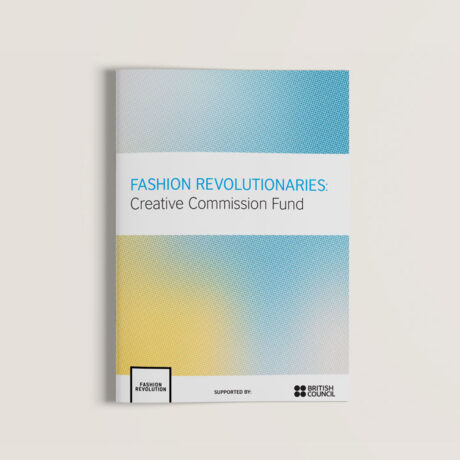
Professional Skills Toolkits
Three Professional Skills Toolkits designed with 'Train-the-Trainer' activities where members engage fashion professionals in their local ecosystem to explore key topics together. Pack includes 'Creativity with Purpose', 'Materials in Transition' and 'Circularity and Regeneration'. Piloted in Mexico, Indonesia and Zimbabwe and delivered via a webinar series led by Jocelyn Whipple and Orsola De Castro to the wider Fashion Revolution Global Network. Available upon request to Fashion Revolution's Global Network and their partners. To request email niamh@fashionrevolution.org.
REQUEST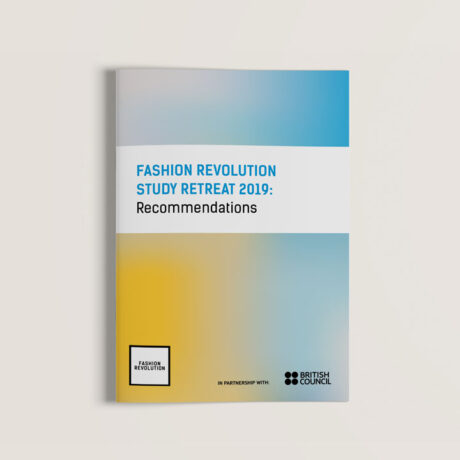
Study Retreat Report and Recommendations
This report and series of recommendations captures a global Study Retreat event hosted in 2019. The retreat brought together 16 Country Coordinators from across the Fashion Revolution Global Network to generate ideas, inspiration and proposals for two global education resources. Available upon request to Fashion Revolution's Global Network. Email niamh@fashionrevolution.org.
REQUESTFashion Revolutionaries Film Series (Parts 1 & 2)
For Fashion Revolution Week 2018 and 2019 the British Council commissioned a series of short films from changemakers in the fashion industry to showcase the solutions that they are generating to the challenges that the fashion industry faces. The films were been created in the spirit of the grassroots movement, using content produced by the practitioners themselves and directed by Kate Cox and produced by the The Smalls.
This series includes: Ukrainian designer RCR Khomenko, Lebanese designer Cynthia Chamat, Filipino accessories designer Ken Samudio, Bangladeshi creative practice Paraa, Mexican artist Victoria Villasana, Ugandan design-duo Catherine & Sons and UK based designers and creatives One By Me, Matthew Needham, Sara Arnold and Katherine Hamnett.
2018 – Part 1
2019 – Part 2
We would like to thank the British Council for their ongoing support and collaboration. In particular Kendall Robbins, Hannah Robinson, Güte Immelman, Lucy Swan, João Guarantani and Sevra Davies of the Architecture Design Fashion Team.
Further thanks go to the wider British Council network of Country Offices around the world in particular British Council Philippines, India, Kenya, Rwanda, Mexico, Indonesia, Zimbabwe, Tunisia and Vietnam for their support in realising projects within the Fashion Revolutionaries programme.

